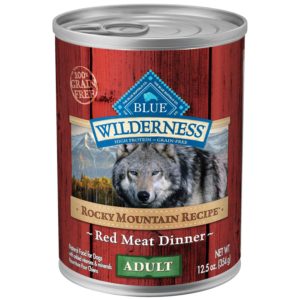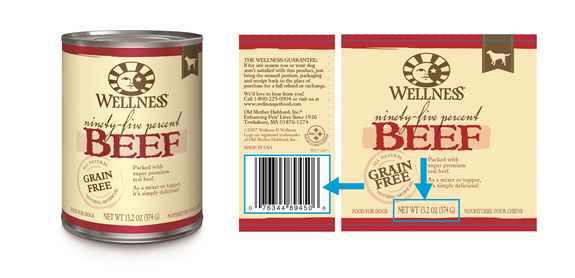Pet food in all forms — dry food, canned food, and treats — with high levels of thyroid hormones can cause hyperthyroidism.

BLUE Wilderness® Rocky Mountain Recipe Red Meat Dinner
Three dogs developed hyperthyroidism after eating canned dog food, including a 4 year-old Shetland Sheepdog, an 8 year-old Tibetan Terrier, and a 15 year-old Labrador Retriever, according to the FDA.
All three dogs got better after switching to another type of food. The FDA tested their canned dog food. All of the samples were positive for beef thyroid hormones, a sign of livestock gullets in the food.
Dangerous levels of thyroid hormones can get into pet food when the slaughterhouse doesn’t completely remove the beef or lamb gullet (laryngeal tissue) along with the thyroid gland.
Livestock gullets are not allowed in food for human consumption. Pet food is made with the “leftover” animal meat, but the thyroid gland is supposed to be removed from livestock gullets before they are processed into food for dogs and cats.
According to the FDA:
Symptoms of hyperthyroidism include excessive thirst and urination, weight loss, increased appetite, restlessness, hyperactivity, elevated heart rate, rapid and/or labored breathing, vomiting, and diarrhea. Continued exposure to excess thyroid hormones can cause damage to the heart and in some cases, death.”
There is no easy way to know if your pet food contains thyroid hormones. Pet owners must ask the manufacturer if they use livestock gullets. This information will not be on the label.
Two pet food companies issued recalls on March 17, 2017 for canned dog food that tested positive for elevated levels of beef thyroid hormones.
WellPet recalled 13.2-oz cans of Wellness 95% Beef Topper for Dogs with “Best-By” dates of 02FEB19, 29AUG19, and 30AUG19 printed on the bottom of the can, and UPC #076344894506.

Wellness 95% Beef Topper for Dogs
Blue Buffalo recalled 12.5-oz cans of BLUE Wilderness® Rocky Mountain Recipe Red Meat Dinner Wet Food for Adult Dogs with a “Best-By” date of June 7, 2019 printed on the bottom of the can and UPC #840243101153.
Blue Buffalo is no stranger to complaints about sick pets who ate their dog food. Last year, the company paid $32 million in the largest pet food class action lawsuit settlement ever.
If you suspect a problem, save the package and a sample of food for testing, contact the manufacturer, and file a Pet Food Complaint with the FDA.
